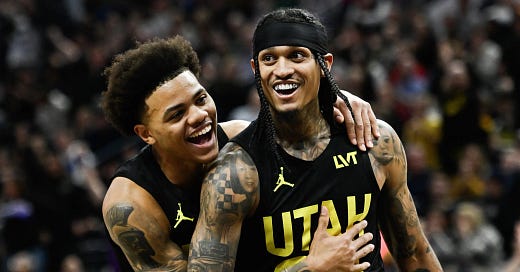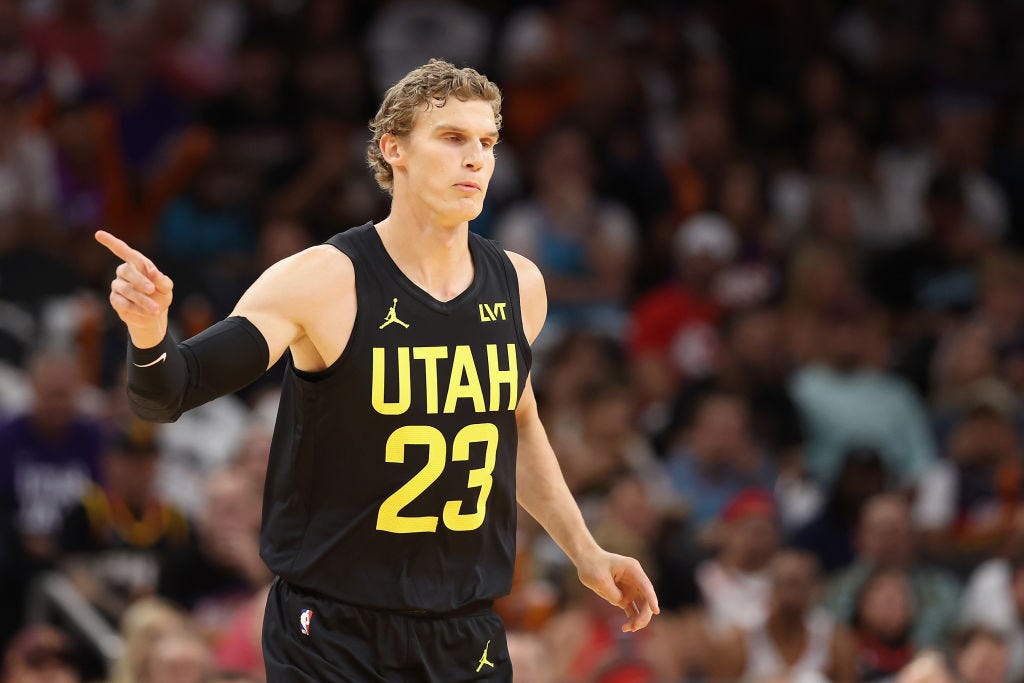Why the Utah Jazz Are in One of the NBA’s Weirdest — But Maybe Also Best — Spots
The Utah Jazz’s rebuild is so far ahead of schedule, they might be on the cusp of contending again very soon.
The Utah Jazz were not supposed to be good this season.
Two years ago, Utah blew up its longtime core of Rudy Gobert and Donovan Mitchell, dealing the former to Minnesota and the latter to Cleveland for a ton of players and future draft picks. It seemed to signal the end of a six-year era that had seen the Jazz post the league’s third-best regular season record but win only three playoff series and never make it to the conference finals. After dealing away its stars, Utah went 37-45 last season — closing the year on a 10-19 skid — and the outlook for this year was similarly gloomy, particularly after the team got off to a 7-16 start through early December.
But recently, the Jazz have been one of the hottest teams in the NBA. Before dropping a few recent games, Utah had won six in a row and nine of its past 10 games, part of a stretch that saw the team win 15 of 19 immediately after its rough start to the season. Suddenly and improbably, Utah is a team that opponents would prefer not to see coming up on their schedule.
Ordinarily, this might still be seen as a bad thing in the macro-obsessed world of NBA front-office strategizing. The Jazz still have just a 10% chance to make the playoffs even after their hot six-week run — in part because playoff probability models are skeptical they are truly good, but also because those wins only brought them up to the Western Conference’s final play-in slot, from which a team needs to win two more consecutive games to actually get into the playoffs. Conventional wisdom dictates that a hot streak that improves your record (giving you worse draft positioning) but doesn’t improve your postseason odds is, counter-intuitively, one of the worst things that can happen to a team in the middle of a season.
Things are a little more complicated for the Jazz, though. Because of pick protections, they don’t actually own their first-round selection if it lands outside the Top 10, having dealt it to OKC as part of a 2021 trade involving Derrick Favors. If Utah hadn’t caught fire in December, they would likely have kept the pick — though it might not have cracked the Top 5, as they had the league’s sixth-worst record before the wins began. And while the 2024 draft class might have depth, it appears to be short on true difference-makers at the moment.
Beyond that, Utah needs to see what it has on its roster — and what that group can do — as much or more than any other team right now.
The main drivers of the Jazz’s recent hot streak have been 25-year-old Collin Sexton and 26-year-old Lauri Markkanen, both of whom rank among the league’s leaders in Wins Above Replacement (WAR) in the past two weeks. Markkanen is up to 17th in the league in WAR (with 4.9) on the season overall, carrying an Estimated RAPTOR rating of +5.1 points per 100 possessions, while Sexton ranks 41st in WAR (3.5) with a RAPTOR of +3.2. Despite both being relative afterthoughts from the trade that sent away Mitchell (who is also playing great right now), Markkanen and Sexton give Utah a pair of incredibly valuable trade assets if the Jazz want to shop them around.
Or, the team may have inadvertently stumbled into a duo that could form the backbone of Utah’s next contender instead. (This might be why the Jazz reportedly have no interest in dealing Markkanen at the very least.) Shocking as it sounds, Markkanen is currently playing well enough to be a strong No. 2 — verging on a weak No. 1 — for a contending team, while Sexton is comfortably above the median RAPTOR for the third-best player on an NBA champion.
If Markkanen and Sexton continue to play at their current RAPTOR levels, they would form a tandem that is within the range of being good enough to lead a championship-level team, historically speaking, if surrounded by one other star:
Getting that last, best star is a lot easier said than done, but that’s where another fascinating part of Utah’s current situation comes in: They own a lot of future draft capital. In addition to their own picks (minus that first-rounder which could convey to OKC), the Jazz have the rights to nine first-round picks from other teams between 2025 and 2029. Just like basketball ops CEO Danny Ainge did when he ran the Boston Celtics, he has stockpiled picks that give Utah the flexibility to either use on prospects or in trades, depending on the team’s needs. If Sexton and Markkanen are truly this good, it could provide the impetus to go get another player and accelerate the Jazz’s window of contention.
That’s a big reason why the Jazz need to see how far they can go this season, to help know exactly how high the future ceiling can be for their stars. Another reason is to figure out who to keep among the rest of the roster.
Aside from veterans John Collins (whose potential has now completely evaporated, it seems) and Jordan Clarkson, both of whom are signed past 2023-24, and Kelly Olynyk, Kris Dunn, Talen Horton-Tucker and Simone Fontecchio, who are on expiring deals and might get moved, the rest of Utah’s rotation is made up of young players that the team needs to assess. And while point guard Keyonte George has struggled (-5.0 RAPTOR) out of that group, the team has already exercised options on Ochai Agbaji and Walker Kessler, both of whom have shown defensive aptitude. Kessler, in fact, leads the league in block rate, 0.5 percentage points clear of Victor Wembanyama.
Between auditioning their young players, keeping an eye on Markkanen and Sexton’s star potential, evaluating trade options and — why not? — also genuinely trying to cash in on that playoff probability, the Jazz have a surprising number of reasons to try and win games for a squad that was projected to be among the bottom of the league this season.
In turn, that puts Utah in a very different — and arguably much more favorable — position from any other team in that class. (Even the Spurs, who can be pretty certain Wembanyama will be the centerpiece of their next contender, have plenty more questions ahead in their future, and fewer reasons to win in the here and now.) If they play their cards right and things break their way from here, the Jazz might have pulled off one of the quickest and most unexpected rebuilds in recent NBA memory.
Filed under: NBA






